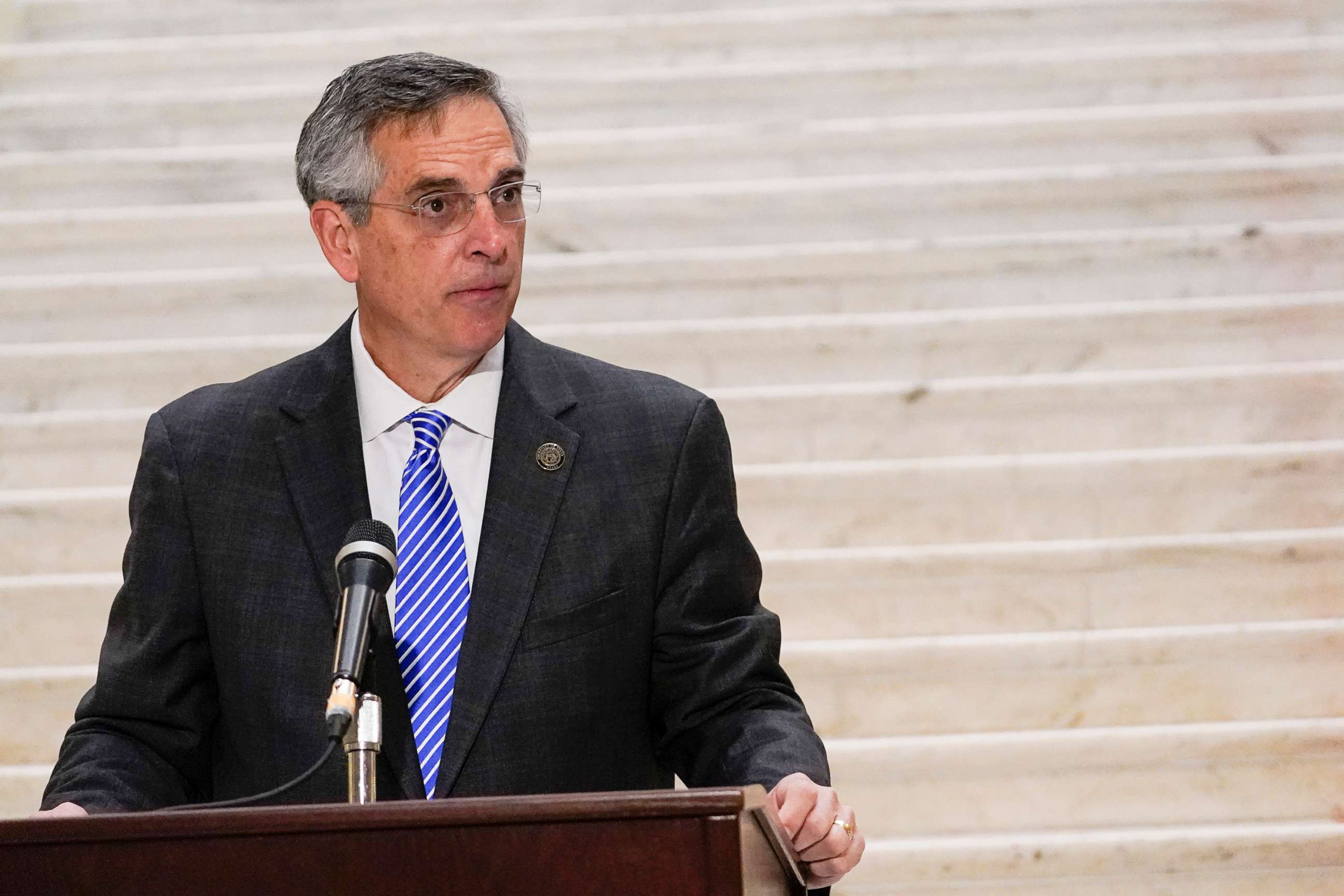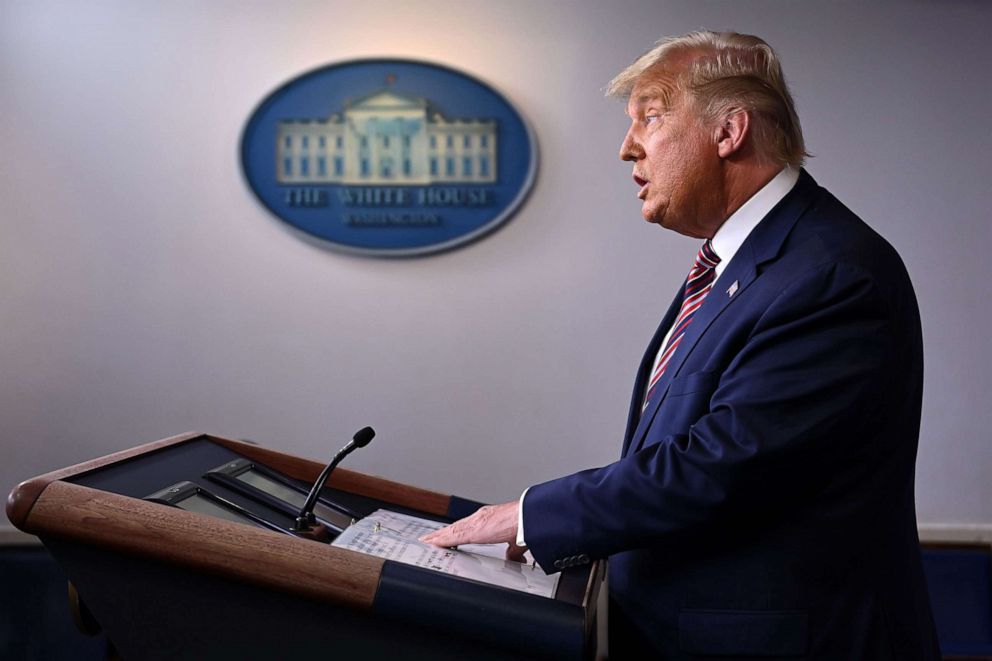Georgia certifies election results, making Biden victory official
The Trump campaign has until Tuesday to request a recount.
Georgia Secretary of State Brad Raffensperger and Gov. Brian Kemp certified the results of the general election Friday, making it official that President-elect Joe Biden won the state's 16 electoral votes.
While Kemp, who served as secretary of state before Raffensperger, followed through with his part in the certification process, he was also critical of the election, and said that is was "simply unacceptable" that thousands of uncounted ballots were discovered during the state's full hand audit and that it cannot happen again during the runoff election in January, when both Senate seats are on the ballot.
The secretary of state's office had erroneously blasted out a press release at 12:26 p.m. saying Raffensperger had certified the election. Forty minutes later, a corrected press release was sent, which said the secretary would certify results Friday. Later in the afternoon, another press release was sent and ABC News confirmed that the secretary had certified the election.
"Working as an engineer throughout my life, I live by that numbers don't lie. As secretary of state, I believe that the numbers that we have presented today are correct," Raffensperger said during a news conference early Friday. "The numbers reflect the verdict of the people, not a decision by the secretary of state's office or our courts, or of either campaigns."
It was the secretary's first time appearing before cameras at the Georgia State Capitol in Atlanta since Veterans Day, when he announced the state would conduct a full by-hand recount of votes in the presidential race. The results of the audit were finalized and released Thursday evening.
Raffensperger had been quarantining because his wife, Tricia, tested positive for coronavirus on Nov. 12. He told the press he'd been tested three times since then and tested negative every time. He removed his mask only upon arriving at the podium.
In brief remarks Friday, taking no questions, Raffensperger said he was "disappointed" President Donald Trump, whom he said he was a "proud supporter of," didn't win the state of Georgia, like he did easily in 2016.

"Close margins of voters leads to fights that are as fierce after Election Day as the campaigns before," he said. "Close elections sow distrust. People feel their side was cheated. We saw this from the Democrats in 2018. And we see this from Republicans today."
After the results of the audit, which reaffirmed the more than 10,000-vote lead Biden held over Trump in Georgia, were released, the president's campaign said Raffensperger "should not" certify results and declared his team would pursue all "legal options."
"This so-called hand recount went exactly as we expected because Georgia simply recounted all of the illegal ballots that had been included in the total. We continue to demand that Georgia conduct an honest recount, which includes signature matching," Trump campaign senior legal adviser Jenna Ellis said in a statement.
Despite the unprecedented hand-count audit reaffirming the results of the machine tabulation were accurate, the Trump campaign is still entitled to request a full recount following certification. It must be formally requested by Tuesday, and under state law the recount would use high-capacity scanners and would not be conducted by hand.
But just because it will be done by machine doesn't mean it won't be another time-consuming undertaking by county election officials.
Not only does the cost of a recount fall on the counties -- and not the Trump campaign -- but officials would be up against the "safe harbor" deadline, of Dec. 8. Congress mandates that presidential election results be considered conclusive six days before the meeting of electors, which is on Dec. 14 this year.
Every county has at least one scanner to conduct a recount, the secretary of state's office has said. The largest counties have more than one, but it will still take days to rescan every ballot cast in the presidential race.
Some counties would possibly be forced to work through the Thanksgiving holiday to complete the recount on time. Election workers across the state, especially in the most populated counties, have had little to no time off since the election, often working into the night and on weekends to power through the first count and then the largest by-hand count in U.S. history.
During his remarks Friday, Raffensperger also laid out his priorities for election reform moving forward.
Without going into too much detail, he said he wants to see legislation that allows his office to be able to intervene if a county has "ongoing systemic problems with administering elections."
"We need to have a remedy that allows the state to address problem areas and get those counties moving in the right direction," he said.
Noting the few thousand uncounted ballots that were discovered in some counties during the audit, he added that there must be a better reconciliation process to prevent that from happening again.
Raffensperger also said he wants a photo ID requirement for requesting absentee ballots, saying the significant increase in voters opting to use this method of voting "has raised concerns about election integrity." No-excuse absentee voting has been allowed in Georgia since 2005, but in past non-pandemic elections only about 5% of voters cast ballots that way.
Photo IDs are required for in-person voters, and Raffensperger said requiring them for absentee ballots would eliminate the "controversial signature verification system" and move the state from a "subjective system to an objective system."
"I will work with legislators to find a solution that allows us to use the same security measures for votes by mail as we have for in-person voting. That would include a photo ID requirement," the secretary said. "We know this works. We know this stops fraud. We know that claims that it would suppress have been proven wrong with empirical evidence or empirical studies."
The Trump campaign and Georgia Republican Party have, for days, made false claims about the state's signature matching process and rejection rates.

"Almost ZERO ballots rejected in Georgia this election. In years past, close to 4%. Not possible. Must have signature check on envelopes now. Very easy to do. Dems fighting because they got caught. Far more votes than needed for flip. Republicans must get tough! @BrianKempGA," Trump tweeted Thursday.
Gabriel Sterling, with the secretary of state's office, had previously said that when Republicans make this argument they are comparing "apples and oranges" because the full rejection rate includes absentee ballots that are received after the deadline, and this type of rejection makes up the "vast majority" of rejected absentee ballots.
Sterling said that of the 1.3 million absentee ballots returned for this election, 2,011 were rejected because of either missing or inaccurate signatures, which equals a 0.15% rejection rate; in 2016, of the 246,000 returned absentee ballots, 580 were rejected over signatures issues, which amounted to 0.15%.
Trump and his allies have taken issue with a March settlement between Raffensperger, the State Election Board, the Democratic Party of Georgia and national Democrats' House and Senate campaign arms. Republicans have claimed the consent decree made it harder for election officials to reject absentee ballots because of signature mismatches and, therefore, means it's less likely to happen. The secretary's office has disputed this, saying Raffensperger has strengthened signature-matching protocols during his tenure.
The consent decree changed how quickly election officials must notify a voter their absentee ballot was rejected if the rejection happens within 11 days of the election. It also required the secretary to enforce on counties a rule requiring an election worker to seek out two colleagues' opinions before rejecting an absentee ballot over a signature issue.
Republicans have also railed against the audit because election workers weren't reverifying every signature accompanying absentee ballots. That also will not happen as part of a formal recount.
Absent a court order or the presentation of "credible evidence to pursue on a specific issue" -- which has not been produced yet -- reverifying signatures will not take place again, according to Sterling.




